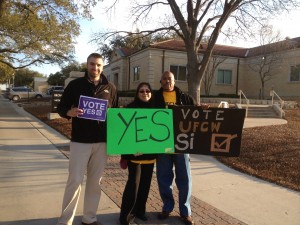June 23, 2014
CertainTeed Workers Say “Yes” to a Union Voice with the Chemical Workers

Eighty workers at the CertainTeed drywall plant in West Virginia, voted to have a union voice and joined UFCW Local 45C. Pictured left to right: Ron Moore, Andrew Gaiser, Josh Mazey, Carl
Sweeney, Lance Heasley.
Eighty workers at the CertainTeed drywall plant in Proctor, West Virginia, voted “Union Yes” on June 6 to join the International Chemical Workers Union Council.
Lance Heasley is a former steward and member-activist with UFCW Local 45C and works as an instrument technician at Axiall, where he and his fellow union members make chlorine and other caustic chemicals. Many of them, including Lance, live side-by-side with workers at the CertainTeed and know each other socially. So, when Lance heard his friends and neighbors talk about how hard it could be working at CertainTeed, he started talking to them about the difference a union could make.
He began to go out of his way to have conversations with CertainTeed workers and slowly built a committee of interested workers. He reached out to the ICWUC organizing department and worked with them to sign up CertainTeed workers on authorization cards. Workers began texting and calling each other and holding meetings to talk about the need for a union at CertainTeed. One of those workers was Carl Sweeney.
One of the major issues for Carl was being able to speak up and speak out without fear of retaliation. “I wanted to go to work every day and not worry about what I said or if I’d be the next one out because someone didn’t like me,” said Carl. “I wanted to speak up when I saw something unsafe and know the problem would be fixed, not seeing me as the problem for bringing it up.”
As soon as the CertainTeed workers filed with the National Labor Relations Board for an election, the company brought in an anti-union law firm and began holding mandatory anti-union meetings and one-on-one sessions to persuade workers to back down. But they stood strong and stayed united, despite company attempts at intimidation.
“I knew I could lose my job, but I also knew something had to change,” said Carl. “We had to stick together, stay united, to make CertainTeed a better place to work.”
That work paid off and Carl and his coworkers are looking forward to addressing their concerns at the bargaining table – including rapidly rising healthcare costs, favoritism, and safety concerns in the workplace.
June 6, 2014
Bhang Chocolate Workers Ratify First Contract
Agreement Sets New Standards, Raises Floor for Cannabis Industry Workers
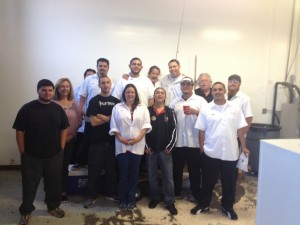 Oakland,CA –Workers at Bhang Chocolate, a cannabis chocolate company in Oakland, Calif., voted overwhelmingly yesterday to ratify their first union contract, becoming members of the 33,000 member-strong United Food and Commercial Workers Union Local 5, which is based in San Jose, Calif.
Oakland,CA –Workers at Bhang Chocolate, a cannabis chocolate company in Oakland, Calif., voted overwhelmingly yesterday to ratify their first union contract, becoming members of the 33,000 member-strong United Food and Commercial Workers Union Local 5, which is based in San Jose, Calif.
“We’re working towards a better future and this new contract is just the beginning,” said Beny Valencio, a chocolatier who has worked at Bhang Chocolate for more than two years.
Among other significant gains and protections for workers in the cannabis industry, the newly ratified contract provides for wage increases, employer health care contributions, paid sick leave and vacation benefits.
UFCW Local 5 members work primarily in retail grocery and meat processing with growing numbers employed in department stores, retail drug stores, candy stores, jewelry stores, agriculture and food processing, wholesale meat, seafood processing, financial services, education and the cannabis industry among others.
“This union contract means everyone at Bhang Chocolate has a voice and everyone will be heard,” said Becky Strider who has worked as a packer at Bhang Chocolate for the past four years.
In the United States and Canada, UFCW is the union for workers in the cannabis and hemp industries. UFCW members in the cannabis industry work predominantly in dispensaries, coffee shops, bakeries, patient identification centers, hydroponics stores, and growing and training facilities.
Headquartered in Oakland, Calif., Bhang Chocolate, an award-winning cannabis chocolate company, is the premier medically infused chocolate company.
###
UFCW Local 5 is affiliated with the United Food and Commercial Workers International Union (UFCW), which represents more than 1.3 million workers, primarily in the retail and meatpacking, food processing and poultry industries. Visit cannabisworkers.org or Facebook.com/CannabisWorkers to learn more about the UFCW’s effort to protect workers’ rights in the cannabis and hemp industries.
May 15, 2014
Tyson Poultry Plant Sanitation Workers Join the RWDSU
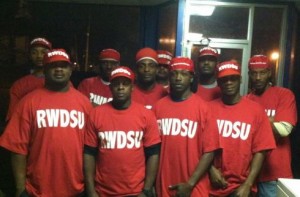
Sanitation workers at a Tyson poultry plant came together to join RWDSU Southeast Council to have a union voice like the RWDSU members who currently process poultry in the same plant.
More than 30 QSI Contract Sanitation workers came together for a union voice on the job and voted to join the RWDSU Southeast Council. The workers in Buena Vista, Georgia, work sanitation inside a Tyson poultry plant. Workers at QSI Contract Sanitation say they needed a voice on the job to address the lack of a grievance procedure and improve their jobs at the plant.
“Every one of us voted to join the RWDSU. We are looking forward to seeing improved working conditions and higher wages in the near future,” said Leon Burke, a five-year employee at QSI.
The poultry processing workers at the Tyson plant are already members of the RWDSU and played a critical role in assisting QSI Contract Sanitation workers win a union voice. After speaking with their RWDSU co-workers, QSI workers realized the only way they could resolve the lack of a grievance procedure and improve their jobs was by joining a union and negotiating a union contract.
“We couldn’t have done this without the support of the RWDSU Tyson steward leadership and members,” Burke continued.
March 27, 2014
Women’s History Month: UFCW Celebrates the Life of Addie Wyatt
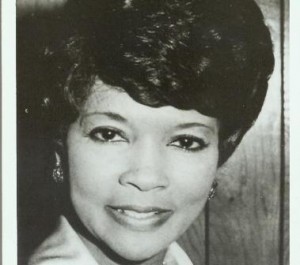 Addie Loraine Cameron, better known as Addie L. Wyatt (1924 –2012), was born in Mississippi and moved to Chicago with her family in 1930. When she was 17 years old, she married Claude S. Wyatt, Jr.
Addie Loraine Cameron, better known as Addie L. Wyatt (1924 –2012), was born in Mississippi and moved to Chicago with her family in 1930. When she was 17 years old, she married Claude S. Wyatt, Jr.
She began working in the meatpacking industry in 1941. Although she applied for a job as a typist for Armour and Company, African American women were barred from holding clerical positions and she was sent to the canning department to pack stew in cans for the army. Due to a contract between Armour and the United Packinghouse Workers of America (UPWA), she earned more working on the packinghouse floor canning stew than she would have made working as a typist, and joined the UPWA after learning that the union did not discriminate against its members.
In 1953, she was elected vice president of UPWA Local 56. In 1954, she became the first woman president of the local, and was soon tapped to serve as an international representative. She held this position through the 1968 merger of UPWA and the Amalgamated Meat Cutters and Butcher Workmen until 1974, when she became director of the newly formed Women’s Affairs Department. In 1970s, she became the first female international vice president in the history of the Amalgamated Meat Cutters and Butcher Workmen and later served as director of its Human Rights and Women’s Affairs and Civil Rights Departments. She served as the first female African American international vice president of the UFCW after Amalgamated and the Retail Clerks International Union merged in 1979.
She and her husband were ordained ministers and founded the Vernon Park Church of God in Chicago. She played an integral role in the civil rights movement, and joined Dr. Martin Luther King, Jr. in major civil rights marches, including the March on Washington, the march from Selma to Montgomery, Alabama, and the demonstration in Chicago. She was one of the founders of the Coalition of Labor Union Women, the country’s only national organization for union women. She was also a founding member of the Coalition of Black Trade Unionists and the National Organization of Women.
In 1984, Addie Wyatt retired from the labor movement as one of its highest ranked and most prominent African American and female officials. In honor of her work, she was named one of Time magazine′s Women of the Year in 1975, and one of Ebony magazine′s 100 most influential black Americans from 1980 to 1984. The Coalition of Black Trade Unionists established the Addie L. Wyatt Award in 1987. She was inducted into the Department of Labor’s Hall of Honor in 2012.
March 26, 2014
University Food Service Workers Vote to Join UFCW Local 1000
More than 150 Sodexo food service workers at Texas Christian University (TCU) voted to have a union voice on the job Monday night and join UFCW Local 1000. According to the workers, the vote was motivated by a change in Sodexo company policy that resulted in roughly 70 percent of TCU dining employees losing benefits such as health care coverage, vacation time, and sick leave.
Sodexo redefined full-time employment terms for workers last fall. When the change took effect, many full-time Sodexo workers at TCU became or were reclassified as part-time workers, effectively losing benefits they previously had as full-time employees.
During the campaign, Sodexo workers had support not only from UFCW Local 1000 members, but TCU students as well. Some students and student groups on campus actively voiced support for the workers’ right to join a union, including the campus chapter of the NAACP.
Negotiations for the workers are set to begin soon.
March 6, 2014
Local 1208 Hosts “Poultry Worker Appreciation Day”
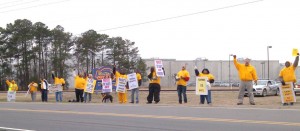 Local 1208, which is largely made up of Smithfield Foods workers in Tar Heel, North Carolina, recently hosted a rally as part of a “Poultry Worker Appreciation Day“. The event was created to bring awareness to the need for improved working conditions and living wages for the workers at the Mountaire Farms plant, which processes chicken.
Local 1208, which is largely made up of Smithfield Foods workers in Tar Heel, North Carolina, recently hosted a rally as part of a “Poultry Worker Appreciation Day“. The event was created to bring awareness to the need for improved working conditions and living wages for the workers at the Mountaire Farms plant, which processes chicken.
About 65 Local 1208 members served baked beans and chicken to the plant workers, staying from 4 a.m. on Wednesday until around 2:30 a.m. the following morning, to make sure they were present for all of the workers’ shift changes. The UFCW members, wearing their UFCW gold, held signs to support the plant workers, demanding equal rights, and calling for more reasonable work-weeks.
Local 1208 Secretary-treasurer Terry Slaughter, who was present at the rally, said that “the workers are the ones that put chicken on our tables and get the poultry orders out. It is hard to feed your family on $9 an hour. These employees need more money and more respect for the job that they do.”
Standing in solidarity with the plant workers, the UFCW is supporting these workers, who have begun trying to organize and join a union. In fact, more than 400 of Mountaire’s 2,000 workers have signed union cards, indicating such interest.
“We’re trying to get management to show more appreciation for their employees … all the things that a job is supposed to show employees,” Slaughter said.
Yesterday, attorneys with Local 1208 filed charges of unfair labor practices with the National Labor Relations Board in Winston-Salem, N.C. The union is asking for an immediate injunction to stop severe and widespread violations of federal labor law.
“We are tired of the treatment and low pay we endure daily at Mountaire,” said Jasmine Isom, who has worked there for three years. “We work hard full time jobs and $10.00 an hour is not enough to raise our families on.”
The charges, which you can learn more about on Local 1208’s facebook page, say that Mountaire Farms has been disciplining employees for their union activity, threatening to have employees arrested, engaging in surveillance and coercion, interrogating employees, threatening termination and change in personal working conditions if employees support the union – all in violation of workers’ legal rights under the National Labor Relations Act.
“The Mountaire workers are standing up to this company and saying we will not be abused and disrespected any longer. We stand proudly with these workers,” said Keith Ludlum, President of Local 1208. “Anytime Mountaire violates the rights of workers we will hold them accountable.”
February 19, 2014
A Shining Light in the South: UFCW Organizer Rose Turner
In 1981, Rose Turner was a nursing home worker in the deep south. When workers decided to try and organize to join UFCW Local 1529 that year, Rose immediately got involved, hoping to change the working conditions: “At that time there was no family medical leave. Women–when they got pregnant, they went out and came back [after giving birth] and they didn’t have a job. You were penalized for getting pregnant, because you had no job. One woman even slipped in the kitchen a broke her knee, [and in order for her to not lose her job] her daughter had to come work while she was out.”
Rose also wanted to change the fact that the workers had no say on the job. “At that time, what they said was the gospel, and it didn’t make any difference what you had to say. They were always right. But the icing on the cake,” says Rose, is when the nursing home’s census went down, and “they called all the oldest workers in and said ‘You all’ve got to go’. Their seniority meant nothing. One woman had been there for over 25 years, but it was just who they liked [that mattered].”
But with the union, much turned for the better, and the workers were able to get a raise.
Knowing that the collective voice of the union would be stronger with more workers, Rose says she “got a group of ladies together and we would go to the other nursing homes and tell them what we needed to do to organize,” and for the next several years she worked towards organizing other neighboring nursing homes in her community and surrounding areas of Arkansas and Tennessee.
Over those couple of years, Rose’s hard work didn’t go unnoticed. She was soon contacted by the local and was offered a position as an organizer. Hesitant but wanting to try it out, Rose was scheduled to go on 90-day union leave in order to do so, which her nursing home contract allowed for. However, the day before she was to go on leave, her employer claimed that since she was one of the oldest workers at the nursing home, she couldn’t go on leave. Fed up with her employer’s games, Rose decided to go all-in to be an organizer and continue to help make a difference in other people’s lives. “After meeting with the reps at the union–I had heard about unions and seen different things–but just seeing the importance of it, and once I got started, I was sent down to Mississippi and saw people in an even worse condition then we had been at the nursing homes.”
The horrible conditions in Mississippi that Rose refers to were that of catfish workers: “They weren’t allowed to go to the bathroom, except once a day. If they went and stayed over five minutes they were being written up. People were losing their thumbs and whole hands [on the lines]. And they didn’t know that the company would keep them on payroll for only a year and then let them go.”
Through her organizing efforts, Rose has worked for more than 18 years to change conditions such as the ones the catfish and nursing home employees experienced, to help give a voice to the workers.
Looking back, Rose says she feels good about “her nursing homes.” She continues to work on organizing campaigns for nursing homes and other industries in the south, and is currently in Tupelo, Mississippi to organize nursing home workers at Golden Living.
“In the south, the minimum wage ain’t nothin’ but 7.25, but none of my nursing homes make minimum wage–in fact, I’ve got some that make twice minimum wage, plus! I feel good about that.” Thanks to their UFCW contracts, the nursing home workers get raises every year. Rose also notes that “they know how much vacation there’s gonna be, and how much sick days they got (which they never had before). So I feel good because I want to know that I wasn’t the only one that progressed or did good because I was in the union–I want people that come behind me to enjoy the benefits, because if it wasn’t for the people before me, I would never have the chance or the opportunity to do what I do today. I wanna know that when I’m gone, people are enjoying the fruit of my labor. I want them to know that it’s not just about me, but everybody.”
Rose always comes back to those who came before her in the fight for civil and worker’s rights: “People paved the way, and we need to pave the way for others to come.” She also notes how intertwined the movements are, saying that “people realize that civil rights have a got a lot to do with workers rights–it’s just like faith and work–you can’t have one without the other, it just ain’t gonna work. You can have faith but without work behind it, it’s no good, and you can have work, but you’ve got to have faith”.
“I’ve been on the trail a long time,” says Rose, of her involvement in the union. Rose is eligible to retire, but she’s not quite ready yet: “When I retire I wanna know that I have done all that I can do. I’ve got a few other contracts and other things I want to [see through].”
Rose and the others who continue to fight for workers rights are a bright spot in the south, which has traditionally been hostile towards unions. Its thanks to workers and organizers like them that the worker movement is spreading–workers in Chatanooga, TN recently came close to organizing with UAW at the VW plant, and Moral Mondays have spread from Raleigh, NC to cities across the country to bring awareness to social justice issues. Its proof that when people stand together, change it inevitable.
February 12, 2014
Bob’s Furniture Workers Say “Yes” to a Union Voice and Join UFCW Local 328
Last week, more than a dozen workers at Bob’s Furniture in Attleboro, Mass., came together for a union voice at work and voted to join UFCW Local 328.
The Bob’s Furniture workers were focused on job security during their campaign to become part of UFCW Local 328. Job security will also be a key element in their contract when negotiations begin.
February 10, 2014
UFCW Minority Coalition Kicks Off Trailblazers Publication with Tribute to Addie Wyatt
February 5, 2014
Black History Month Celebrations: Show Host Richard Fowler Empowers Youth to Make a Difference
 To continue our celebration of Black History Month, we are sharing another story of someone who has made a great impact on civil rights and economic equality. That person is Richard Fowler.
To continue our celebration of Black History Month, we are sharing another story of someone who has made a great impact on civil rights and economic equality. That person is Richard Fowler.After years of going into the voting booth with his mother as a young child, Fowler learned the importance of being an active voice in one’s community. Working with the NAACP, he has helped over 1000 young voters in his native Florida to get registered and organize. He has also worked as a campaign manager for political candidates, to work on issues that uplift women, youth of color, and LGBTQ and low-income communities.
Working with youth in order to empower them to make a difference in their own and their communities’ lives is clearly important to Fowler, who has trained about 2,000 young people on how to make their voices heard through messaging and media. Fowler’s trainings no doubt draw on his experiences as the host of his own radio show (The Richard Fowler Show), which has recently partnered with the popular show The Young Turks. Additionally, Fowler serves as the interim director of Generational Alliance, which is made up of over 20 youth organizations dedicated to increasing collaboration and coordination within the youth movement through the following methods:
1. Create cultural spaces for young progressive leaders
2. Sit in progressive spaces that have historically left out underrepresented communities
3. Provide trainings for staff of members’ organizations to fill the leadership development gap
4. Help organizations collaborate on advocacy issues they align with
5. Uplift and promote their communications efforts through media training, booking and digital organizing
Fowler’s work at the Alliance and at his own show also includes educating folks on important issues, like the Affordable Care Act, via YouTube videos.
Fowler is carrying the torch of the leaders of the civil rights movement who came before him, using new media and technology to inspire young people to make a difference in new ways. To learn more, you can follow him on Twitter @RichardAFowler.

